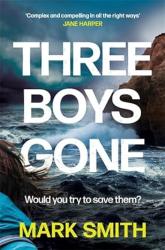When three 16 year old boys on a school hiking trip run into perilous surf, the only witness is Grace Disher, the teacher in charge of the trip, who reluctantly defers to the first rule of rescue: don't create another casualty and stands helplessly by as the boys disappear.
Switch then to the remaining boys in the party, and the two other teachers who were with them on the hike as Disher was setting up for the group's arrival at their next destination. It was when she was hiking back in to meet them that she came across these three, who inexplicably it seems, simply ran straight into the ocean in conditions that nobody would think to swim in. Then to the frantic search for a phone signal, the arrival of police, SES and search and rescue. The remaining boys and the two (male) teachers are evacuated out to a nearby town and a motel for the night, but Disher opts (insists) on staying in the area, providing what assistance she can to the searchers, being interrogated by a local cop as to the circumstances of the drownings, and why she didn't try to rescue them.
The story rapidly becomes about that decision - should she have sacrificed her own life in what she could see would be a fruitless attempt to save the boys? As the story is taken up by the media, the witch hunt grows, Disher's safety is compromised, and her home life exposed. Assumptions are made about her competency and there's plenty of hints that a woman, worse still a lesbian, should not have been in the position she was in - in charge.
I have to confess to being very challenged by THREE BOYS GONE. On the one hand, one hell of a premise - should you follow that "rule" of rescue, or should you throw caution to the winds as the only adult in the area. Good point, and one that is well worth considering in these sorts of circumstances, as is the human tendency to blame when the inexplicable happens. On the other hand there's a lot to the delivery of the premise that seemed convenient. A lesbian, a woman, worse still a "not a mother" she stuffed up the risk assessment process, she was there when the boys entered the water, she didn't rescue them from the impossible conditions. It just seemed to take an age for anybody to ask what made the boys do what they did, and where were the male teachers who had been with them at the time? What were they doing? To say nothing of the oddness of the scenario - a bunch of traumatised kids put up in a motel miles from home after such an event, no parents charging in to collect them, a headmaster whose response was frankly weird, and then all IT gubbins which just didn't ever reach the vicinity of the general area of plausibility.
For this reader, as the implausibilities piled up, the inevitability of the twist at the end got more obvious and that original premise disappeared in a soup of stalkery, homophobic, misogynistic byways and assorted red herrings that went off and started to pong.
Three Boys Gone

'First rule of rescue: don't create another casualty.'
Grace Disher is about to face every teacher's worst nightmare.
Three of her students are going to die.
On a high school camping trip, three boys slip away for an ocean swim. By the time Grace catches up, the perilous surf conditions are overwhelming the teenagers. If she goes in, she will die trying to save them.
Should she have given her life?
The question haunts Grace as investigations begin and her decision not to attempt a rescue comes under scrutiny. Hounded by conflicted staff, grieving parents and relentless media - all dissecting her actions, all looking for someone to blame - Grace's safety is compromised and she must be careful who she trusts.
And she's not the only one with a secret.
Add comment